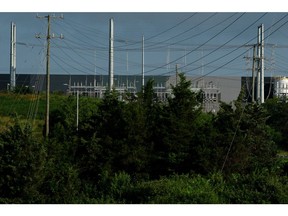
Article content
(Bloomberg) — The biggest US grid has no spare supply for new data centers, meaning project developers will need to start building their own power plants, according to the system’s independent watchdog.
THIS CONTENT IS RESERVED FOR SUBSCRIBERS ONLY
Subscribe now to read the latest news in your city and across Canada.
- Exclusive articles from Barbara Shecter, Joe O'Connor, Gabriel Friedman, and others.
- Daily content from Financial Times, the world's leading global business publication.
- Unlimited online access to read articles from Financial Post, National Post and 15 news sites across Canada with one account.
- National Post ePaper, an electronic replica of the print edition to view on any device, share and comment on.
- Daily puzzles, including the New York Times Crossword.
SUBSCRIBE TO UNLOCK MORE ARTICLES
Subscribe now to read the latest news in your city and across Canada.
- Exclusive articles from Barbara Shecter, Joe O'Connor, Gabriel Friedman and others.
- Daily content from Financial Times, the world's leading global business publication.
- Unlimited online access to read articles from Financial Post, National Post and 15 news sites across Canada with one account.
- National Post ePaper, an electronic replica of the print edition to view on any device, share and comment on.
- Daily puzzles, including the New York Times Crossword.
REGISTER / SIGN IN TO UNLOCK MORE ARTICLES
Create an account or sign in to continue with your reading experience.
- Access articles from across Canada with one account.
- Share your thoughts and join the conversation in the comments.
- Enjoy additional articles per month.
- Get email updates from your favourite authors.
THIS ARTICLE IS FREE TO READ REGISTER TO UNLOCK.
Create an account or sign in to continue with your reading experience.
- Access articles from across Canada with one account
- Share your thoughts and join the conversation in the comments
- Enjoy additional articles per month
- Get email updates from your favourite authors
Sign In or Create an Account
or
Article content
“There is simply no new capacity to meet new loads,” said Joe Bowring, president of Monitoring Analytics, which is the independent watchdog for PJM Interconnection, the grid that extends from Washington DC to Chicago. “The solution is to make sure that people who want to build data centers are serious enough about it to bring their own generation.”
Article content
Article content
Article content
PJM, which is home to the highest domestic concentration of data centers, is becoming a test case for artificial intelligence’s voracious energy needs. Already, supplies have gotten so tight from the data center boom thus far that costs in an annual auction PJM held last year to procure capacity rose to a record $14.7 billion. (The auction provides a key revenue source for generators within the system.)
Article content
By signing up you consent to receive the above newsletter from Postmedia Network Inc.
Article content
High prices are likely to continue and signal that PJM “doesn’t have any capacity to spare,” Bowring said on a panel at Infocast’s PowerUp Data Centers conference in northern Virginia on Monday.
Article content
The results of the next auction, which are scheduled to be released late Tuesday, are expected to show capacity prices match or exceed all-time highs, according to Barclays Plc. The auction results are an indicator of what the AI boom will cost consumers as competition increases for the scant spare capacity on the grid.
Article content
PJM didn’t provide comment.
Article content
Capacity costs of $14.7 billion in last year’s auction, which procured supplies for the 12-month period that started this past June, were up from $2.2 billion for the two consecutive previous years. A recent analysis from Monitoring Analytics attributed more than $9.4 billion of that jump to existing and projected demand from data centers.
Article content
Article content
Bowring said that PJM should set up an expedited review process if data centers bring new generation so they can be connected to the grid quickly as long as they are reasonably matched in size. This would help solve significant uncertainty in PJM’s long-term demand forecast because it would filter projects and reduce years-long reviews for grid connections by matching supply and demand from the start, he said. Bowring added that companies that sign clean supply contracts with existing power plants aren’t solving the issue of getting a connection to the grid — they instead need to bring on new supply, he said.
Article content
(Updates with additional context and comments starting in third paragraph)
Article content

.jpg) 10 hours ago
1
10 hours ago
1
 English (US)
English (US)